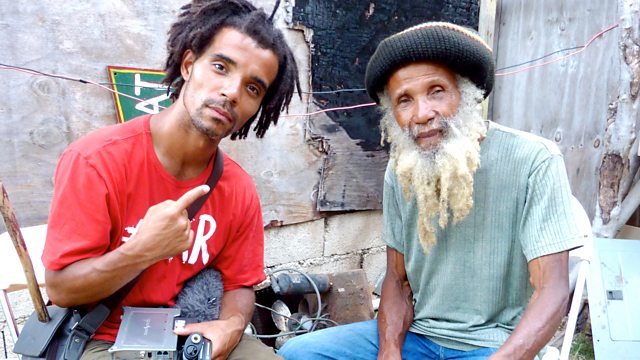Episode 1
British rapper, poet and political commentator Akala visits Jamaica to examine the cultural and sociological significance of Rastafari and its music. 1/2.
Rastafari is Jamaica's most famous export. Alongside Bob Marley - the world's most recognised Rastafarian - this cultural and spiritual movement is the enduring global image of the Caribbean island. For better or worse, the red, green and gold colours, dreadlocks, reggae music and marijuana are all closely associated with Jamaica. But what role has this spiritual movement had in forming Jamaica's soul and identity?
Presented by political commentator and educator Kingslee Daley, this series examines how Rastafari turned from an ostracised religious sect into a global phenomenon. Kingslee is better known as Akala, a British poet, rapper and founder of the Hip-Hop Shakespeare Company. Born in London he was brought up immersed in Rasta culture by his father. In these two half hour programmes, Akala travels to Jamaica to discover the cultural and sociological significance of his spiritual heritage.
Rastafari first came to prominence in 1930s Jamaica, emerging from the civil rights struggle during British colonial rule. It's a complicated synergy of the Old Testament and the teachings of pan-Africanist Marcus Garvey who predicted in the 1920s that "a black king shall be crowned in Africa" ushering in a "day of deliverance." When the Ethiopian prince Ras Tafari - who was also known as Haile Selassie I - became Emperor in 1930, the descendants of slaves in Jamaica took this as proof that Garvey's prophecy had come true. The fact that Selassie was also a pan-Africanist with black empowerment philosophies of his own only further cemented their belief. Many Rastafari believe Selassie to be the second coming of Jesus, a black Christ. But whatever the theologies surrounding Rastafari, its importance for Jamaica and for the Jamaican diaspora has gone way beyond religion.
In this first part of the series, Akala uncovers the story of Rastafari and its role in replacing the shackles of colonial rule with a forgotten African identity. At first Rastas were deemed the scourge of society, hounded by both the British and Jamaican authorities. But thanks to an explosion of incredible music in the 1970s, the Rastafari message took over the whole island before spreading around the world.
Contributors include writer Sir Salman Rushdie, the Kenyan author and political activist Ngugi wa Thiong'o, Professor Carolyn Cooper from the University of the West Indies and the residents of the early Rasta camp known as Pinnacle.
Last on
More episodes
Previous
You are at the first episode
Next
Music Played
-
![]()
Burning Spear
People Get Ready
- Man in the Hills.
- Island.
- ILPS 9412.
-
![]()
King Tubby & Lee “Scratch” Perry
African Roots
- At The Grass Roots Of Dub.
- Fay Music.
- FM 101.
-
![]()
The Silvertones
African Dub
- African Dub (single).
- Trojan.
- TRO9013.
-
![]()
Yabby U
Praises
- Beware Dub.
- Grove Music.
- GMLP 4.
-
![]()
Anthony Johnson
Dreadlocks
- Arise Rootsman - Jamaican Roots 1965-1983.
- Trojan.
- TJDDD118.
-
![]()
Sugar Minott
Africa is the Black Man's ��������
- Good Thing Going.
- Trojan.
- TJACD210.
-
![]()
Bob Marley & The Wailers
IRON LION ZION
- ONE LOVE: THE VERY BEST OF BOB MARLEY & THE WAILERS.
- TUFF GONG.
- BMWCD3/-586024-2.
-
![]()
Bob Marley & The Wailers
RASTA MAN CHANT
- BURNIN.
- ISLAND.
- 0602498-233375.
-
![]()
Bob Marley & The Wailers
Jah Is Mighty
- Soul Rebels.
- Earmark.
- 43023.
Broadcasts
- Tue 22 Jul 2014 11:30�������� Radio 4
- Sat 26 Jul 2014 15:30�������� Radio 4




